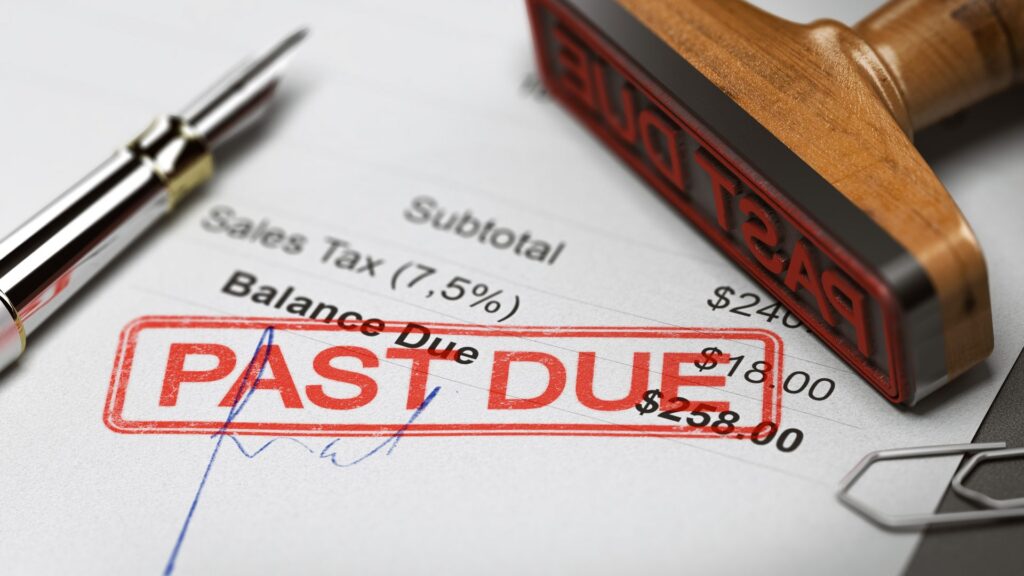Effective strategies for commercial debt recovery
There is no doubt credit control is one of the most important activities for any business, yet having creditors paying on time is wishful thinking rather than reality. Some experts state that a few late payments aren’t harmful to their business.
In fact, late payments indicate that the company’s invoicing policies are well-written and support business growth. All of this with the assumption that the invoices will be paid eventually, without any need to start the debt recovery process. In practice, many companies are facing aged debt situations, where implementing a commercial debt collection process is inevitable and necessary.
Moreover, a healthy cash flow isn’t possible without proper debt management in place. Although debt recovery seems to be a time-consuming process and it might come with the risk of casting a shadow over business relationships, it plays a crucial role in keeping company cash flowing, and it shouldn’t be omitted.
Since late payments are unavoidable, the question is what is the best possible way to manage debt collection in order to get your invoices paid as soon as possible?
But first things first, let’s start with clarifying what is commercial debt recovery and what are the options when claiming B2B debts.
What is commercial debt recovery and how does it work?
Commercial debt recovery, also known as B2B debt recovery or business debt collection, is a process of reclaiming business debt from unpaid invoices, business loans or other financial liabilities defined in a legal business agreement between corporate clients and other business institutions.
To restore the debt, businesses in the UK have to work with a registered Debt Collection Agency (DCA). A Debt Collection Agency usually steps in when the invoice is overdue by 90-120 days and when the debtor clearly ignores payment reminders. After verifying the debtor, the DCA will attempt to get in touch and establish the best possible way to retrieve a payment. Creditors can claim debt recovery costs under legal regulations. If they don’t succeed, they will start a legal claim and take action based on a court order. In general, the commercial debt recovery process isn’t complex and time-consuming. A county court judgment can significantly impact a debtor’s credit rating, making it crucial to address the judgment promptly.
Moving forward, business creditors have two options when it comes to B2B debt recovery:
- Selling the debt to DCA and handing over the responsibility of getting money back from the debtor.
- Assign the debt to DCA and stay in control of the entire process of debt recovery.
The first option is the quickest way to get the money back and it helps when the company has cash flow issues – the DCA buys the debt from the creditor and proceeds with debt collection on its own terms, the latter keeps the primary creditor in charge of the decision process, but it’s the DCA’s job to execute the debt collection.
Regardless which option is chosen there are best practices we recommend following to make the process work for the business and help avoid issues with cash flow in the future. It’s vital that commercial debt collection is as smooth and painless as possible for both parties, and that it’s conducted ethically with mutual respect. In many situations, debtors are still creditors clients, which makes B2B debt recovery a very sensitive process that might impact customer relationships.
What is best practice in debt collection?
Have a debt management system in place
Each company should establish a clear debt management process and credit policy as a part of the business contract with their clients. They should make it available to its business partners and clients. At the same time company should keep track of all invoices and stay on top of any late payments. This simple step will help reduce late payments and confusion with the debt recovery process. Using debt management software could be an effective way to stay on top of your debtors and collect money effortlessly. With all the crucial data in one place, process automation, debt collection software allows the commercial debt recovery process to be handled from start to end and keep everything in order.
Set the fees and make the debtor aware of them
Setting late fees and making them a part of the credit policy sends a clear message to the debtor about the financial consequences of late payment. Information on late fees should appear on the invoice or in the contract. This simple step can not only help reduce late payments but will also compensate the creditor for any additional costs when they happen.
If you’re not a registered Debt Collection Agency, work with one
Cooperating with a DCA is required in the UK and it makes the creditor’s life easier, as the entire process of commercial debt recovery is taken care of by professionals. Working with a specialised debt recovery agency provides businesses with efficient and effective services for handling overdue invoices. That includes chasing the debt, legal action or collecting the money. Working alongside a DCA to retrieve late payments is also more effective and helps businesses get their money back faster.
Start the debt recovery process when the invoices are no more than 90 days overdue
Debt collection can be a very time-consuming process. Addressing outstanding debts promptly is crucial to minimise financial impact and expedite payment collection. The sooner it starts, the greater the chance the money will be recovered quickly, without any unnecessary costs.
Establish clear communication with your debtor
Although the debt collection process usually starts when invoices are 90-120 days overdue, companies can contact debtors earlier with polite reminders. Moreover, sending the demand letter before 90 days is required to establish a paper trail, which can be used later in the commercial debt collection process. Staying in touch with debtors gives the business insight into the debtor’s financial situation and quite often helps to resolve payment problems before taking legal action.
Prioritise debtors that are most likely to pay back at the very first stages of the debt collection process
Either a DCA or the creditor should do the research and analyse the debtors’ financial situation in order to establish the best plan to obtain the debt. Focusing on those who can pay as soon as possible saves creditor’s time and money, especially in situations when the creditor has cash flow issues.
Stay professional and be ethical
Debt collection isn’t an easy and pleasant process. It’s important to keep focused and stay on top of the game despite the circumstances. Illegal actions, abusive behaviour and threats are the worst possible solutions and they will quickly turn against the creditor.
Meet the debtor halfway
It’s crucial to remember that there are always two sides to the debt collections process and both parties might be in a difficult financial position. The one-size-fits-all rule doesn’t really work for any debt collection process. Meeting debtors halfway, giving them options and adjusting repayment plans to their situation, isn’t only a goodwill gesture but an effective tactic for a creditor to retrieve the money. Establishing a plan which works for both parties is a no-brainer.
Commercial debt collection in UK law
The UK government provides very clear guidelines on the process of late payments of commercial debts in the Late Payment Directive document.
Under UK law, businesses must pay each invoice within 60 days from the date it was issued unless the contract between creditor and debtor states otherwise. Debtors will be forced to pay interest and reimburse the creditor reasonable recovery costs if they do not pay for goods and services on time.
It is considered a good practice to send a demand letter before the debt collection process to start a paper trail. Such letter should include the names of both businesses, detailed information about the debt, time frames for repayment and a clear statement demonstrating that failure to fulfill the terms of the agreement will lead to the start of the legal process. If the debt remains unpaid, transitioning to legal proceedings may be necessary as a last resort, which involves formal steps and fees that can significantly impact business relationships.
Targeted audience
Commercial debt recovery targets businesses and corporate clients, yet the Late Payment Directive guidance also points to public authorities being involved in commercial transactions with private businesses.
As described in the document:
The UK Government recognises that the public sector should set a strong example by paying promptly. Over time it has been improving its payment times to assist the cash flow of businesses and especially small businesses. The Directive proposes that the Member States shall ensure that in commercial transactions where the debtor is a public authority, the payment period does not exceed 30 calendar days following receipt by the debtor of the invoice. This matches Government’s current best practice for the public sector.
Fee structure
British law specifies a statutory interest rate, which is calculated as equal to the sum of the Bank of England reference rate plus at least 8% of the Debt Collection Agency fee. The reference rate is set by the Bank of England for 6 months twice a year: 1st from January to June and 2nd from June to December. It’s worth mentioning that a DCA cannot conduct more than 8% of the interest rate. Additional collection fees will be charged separately. It’s usually a creditor who pays collection fees unless the contract between creditor and debtor points to the debtor as the responsible party for covering those charges. Yet another reason to have a credit policy in place. Additionally, the creditor can be paid compensation for late payment costs. Rates depend on the amount of debt:
- Up to £999.99: £40
- £1,000 to £9,999.99: £70
- £10,000 or more: £100
How can debt management help with the commercial debt recovery process?
Late client payments are not only the reason for paying suppliers late. Increasing debt, reducing salaries or paying staff late also causes 1 in 5 business insolvencies in the UK.
Positive cash flow is a direct indicator of a healthy and prosperous business providing the company with a buffer for potential financial challenges, enabling future investments and growth or helping with debt settlements. That’s is why it’s so important that companies are in control of their debts from day one and manage debt recovery efficiently.
Spyrosoft’s debt management system, Debt Pro, provides a platform where customers can view all their financial commitments, consolidated in one place. They can determine the best type of repayment agreement, complete the repayment process in multiple instalments, or all at once, and submit an application using the online customer centre.
Book your no-obligation demonstration!
Schedule a meetingIt is tailor-made to better address customers, with all activities completed with a few clicks through the dashboard. Available 24/7 with no requirement for face-to-face appointments or wet ink signatures it offers complete convenience. We wanted to make a highly efficient software that fits seamlessly with a specific workflow. It’s a a tool that combines automation and advanced analytics to help businesses thrive. Debt Pro can be used by clients who don’t usually offer online banking, and it works well for both individuals and small to mid-size businesses.
Utilise professional debt collection services and enhance your debt recovery strategy by efficiently managing accounts receivable through digital channels and automated processes. Get in touch with us if you need our support to help you to move your debt management processes into the digital era.
About the author
Contact us
Transform your financial products with cutting-edge technological innovations.
RECOMMENDED ARTICLES




